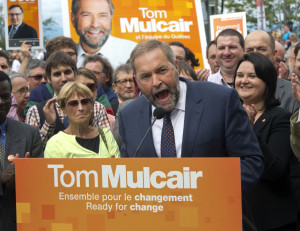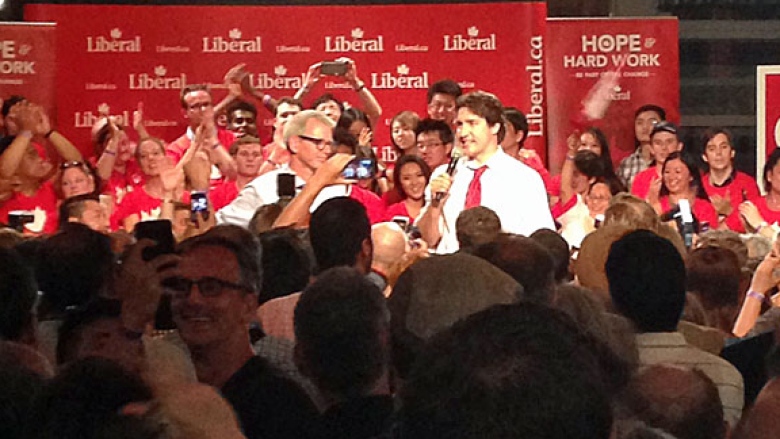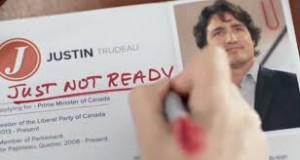October 16, 2015
BURLINGTON, ON
The natural order of things has been restored. Tom Mulcair and his NDP were the team to beat when this election campaign first kicked off. He seemed unbeatable with a strong lead and growing support across the country. Yet, as we head into the final stretch of the campaign, the NDP has fallen into their time-honoured third place with virtually no hope of winning.

Federal NDP Leader Tom Mulcair speaks to supporters at a rally in Quebec City, Que. THE CANADIAN PRESS/Ryan Remiorz
Some might say Mr. Mulcair’s party is just returning to its traditional place in the hearts and minds of Canadian voters. Others might speculate that the early polls were influenced by an artificial boost from the impressive NDP provincial win in the heart of Tory-land, Alberta. And everybody likes a winner.
Then there was the niqab issue, which saw a principled Mulcair at odds with the majority of Quebecers, who simply object to people wearing that symbolic face covering. Mulcair’s ambiguity over the west-east energy pipeline, where he was accused of saying different things in different languages, didn’t help. And his vehement support for federalism, despite his party’s Sherbrooke Declaration (allowing a Quebec exit with a 51% vote), sullied his image among previous ardent-separatist supporters.
In the beginning it looked like Trudeau had suffered irreparable damage from the Harper “not ready yet” attack ads. The Liberals had come out of the gate without much of a platform for voters to consider, and voters had responded by switching their ‘parked’ votes from the Libs to the NDP. If that trend were to have continued Mulcair would have won, become PM and maybe even got a majority.
So Tom Mulcair figured he could play it safe. He cast himself as the right-winger-on-the-left, hoping to bring conservative-minded voters over his new centrally positioned party. He essentially adopted Harper’s economic policies, fine tuned his last budget, and personalized it to include some NDP items – but promised the same Tory balanced budget program.
Though he’s not yet buried, it sure looks like Tom Mulcair became the architect of his own demise. For those who knew of his past, even changing the face of an ‘Angry Tom’ by wearing a forced smile didn’t help. You can’t have it both ways! You can’t be a social reformer and promise it won’t cost anything. There is no free lunch. Mulcair, by wanting to offer everything to the voters, has convinced them that he is really offering nothing new.

The federal election is certainly not over – but there is some momentum – a tight race that the voters will have to figure out. Listen to the advertising and ask questions.
Mr. Trudeau overcame those attack ads in the course of the debates. Then he went on the offensive, announcing a bold platform agenda. He went beyond the other leaders, promising the first major tax reform since Mulroney, reversing some of the tax burden the former PM had placed on the middle class. And Trudeau’s most exciting promise was to deliver a Canadian ‘new deal’ – a spending program to create employment improving transit and other infrastructure.
If anyone was concerned about his need to run deficits for the next couple of years, he had renowned deficit fighter Paul Martin at his side. His youth and dynamic presence in the debates, and at rallies, provided a contrast between him and the other leaders. So his poll numbers have moved forward, leaving the other parties in his dust. But there is not enough dust for a majority even if all the stars were all to align.
Still, Trudeau has emerged as the strongest of the two (three in Quebec) anti-Harper candidates, And that makes a Liberal candidate the strategic choice for those voting ‘anyone-but-Harper’.
 Ray Rivers writes weekly on both federal and provincial politics, applying his more than 25 years as a federal bureaucrat to his thinking. Rivers was a candidate for provincial office in Burlington where he ran as a Liberal against Cam Jackson in 1995, the year Mike Harris and the Common Sense Revolution swept the province. Rivers is no longer active with any political party.
Ray Rivers writes weekly on both federal and provincial politics, applying his more than 25 years as a federal bureaucrat to his thinking. Rivers was a candidate for provincial office in Burlington where he ran as a Liberal against Cam Jackson in 1995, the year Mike Harris and the Common Sense Revolution swept the province. Rivers is no longer active with any political party.
Background links:
Polls Is Keynes Winning Liberal Platform

















All of the media outlets are using their secret polls to categorically state the outcome of the election before it has taken place. Doesn’t this replace democracy? After all, if we already know the results of the election, what is the point of voting? How many people will not vote in this election for this reason? We also know that pollsters can be motivated to produce results that their clients wish to receive.
A better solution would be to place all election-period polls under compulsory intra-party approval with full public release as well as being subject to a significantly burdensome tax. Why the tax? Just like candy in a store is taxed, polls too are superfluous and should be given the same treatment.